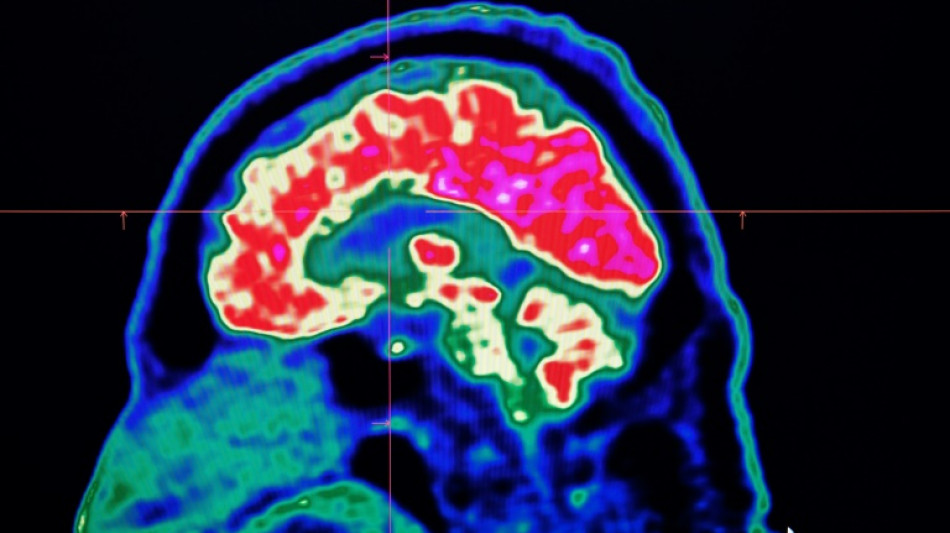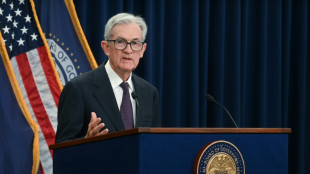
-
 India's Iyer says 'getting better by the day' after lacerated spleen
India's Iyer says 'getting better by the day' after lacerated spleen
-
Yesavage fairytale carries Blue Jays to World Series brink

-
 Bank of Japan keeps interest rates unchanged
Bank of Japan keeps interest rates unchanged
-
Impoverished Filipinos forge a life among the tombstones

-
 Jokic posts fourth straight triple-double as Nuggets rout Pelicans
Jokic posts fourth straight triple-double as Nuggets rout Pelicans
-
UN calls for end to Sudan siege after mass hospital killings

-
 Teenage Australian cricketer dies after being hit by ball
Teenage Australian cricketer dies after being hit by ball
-
As Russia advances on Kupiansk, Ukrainians fear second occupation

-
 Trade truce in balance as Trump meets 'tough negotiator' Xi
Trade truce in balance as Trump meets 'tough negotiator' Xi
-
China to send youngest astronaut, mice on space mission this week

-
 Yesavage gem carries Blue Jays to brink of World Series as Dodgers downed
Yesavage gem carries Blue Jays to brink of World Series as Dodgers downed
-
With inflation under control, ECB to hold rates steady again

-
 Asia stocks muted with all eyes on Trump-Xi meeting
Asia stocks muted with all eyes on Trump-Xi meeting
-
Personal tipping points: Four people share their climate journeys

-
 Moto3 rider Dettwiler 'no longer critical' after crash: family
Moto3 rider Dettwiler 'no longer critical' after crash: family
-
US economy in the dark as government shutdown cuts off crucial data

-
 Trump orders nuclear testing resumption ahead of Xi talks
Trump orders nuclear testing resumption ahead of Xi talks
-
'Utter madness': NZ farmers agree dairy sale to French group

-
 Samsung posts 32% profit rise on-year in third quarter
Samsung posts 32% profit rise on-year in third quarter
-
30 years after cliffhanger vote, Quebec separatists voice hope for independence

-
 Taxes, labor laws, pensions: what Milei wants to do next
Taxes, labor laws, pensions: what Milei wants to do next
-
South Sudan's blind football team dreams of Paralympic glory

-
 US says 4 killed in new strike on alleged Pacific drug boat
US says 4 killed in new strike on alleged Pacific drug boat
-
What we do and don't know about Rio's deadly police raid

-
 'They slit my son's throat' says mother of teen killed in Rio police raid
'They slit my son's throat' says mother of teen killed in Rio police raid
-
Arteta hails 'special' Dowman after 15-year-old makes historic Arsenal start

-
 Google parent Alphabet posts first $100 bn quarter as AI fuels growth
Google parent Alphabet posts first $100 bn quarter as AI fuels growth
-
Underwater 'human habitat' aims to allow researchers to make weeklong dives

-
 Maresca slams Delap for 'stupid' red card in Chelsea win at Wolves
Maresca slams Delap for 'stupid' red card in Chelsea win at Wolves
-
'Non-interventionist' Trump flexes muscles in Latin America

-
 Slot defends League Cup selection despite not meeting 'Liverpool standards'
Slot defends League Cup selection despite not meeting 'Liverpool standards'
-
'Poor' PSG retain Ligue 1 lead despite stalemate and Doue injury

-
 Liverpool crisis mounts after League Cup exit against Palace
Liverpool crisis mounts after League Cup exit against Palace
-
Kane scores twice as Bayern set European wins record

-
 Radio Free Asia suspends operations after Trump cuts and shutdown
Radio Free Asia suspends operations after Trump cuts and shutdown
-
Meta shares sink as $16 bn US tax charge tanks profit

-
 Dollar rises after Fed chair says December rate cut not a given
Dollar rises after Fed chair says December rate cut not a given
-
Google parent Alphabet posts first $100 bn quarter as AI drives growth

-
 Rob Jetten: ex-athlete setting the pace in Dutch politics
Rob Jetten: ex-athlete setting the pace in Dutch politics
-
Juve bounce back after Tudor sacking as Roma keep pace with leaders Napoli

-
 Favorite Sovereignty scratched from Breeders' Cup Classic after fever
Favorite Sovereignty scratched from Breeders' Cup Classic after fever
-
Doue injured as PSG held at Lorient in Ligue 1

-
 Leverkusen win late in German Cup, Stuttgart progress
Leverkusen win late in German Cup, Stuttgart progress
-
Jihadist fuel blockade makes life a struggle in Mali's capital

-
 Uber plans San Francisco robotaxis in Waymo challenge
Uber plans San Francisco robotaxis in Waymo challenge
-
Paramilitary chief vows united Sudan as his forces are accused of mass killings

-
 Trump, Xi to meet seeking truce in damaging trade war
Trump, Xi to meet seeking truce in damaging trade war
-
Divided US Fed backs second quarter-point rate cut of 2025

-
 'Amazing' feeling for Rees-Zammit on Wales return after NFL adventure
'Amazing' feeling for Rees-Zammit on Wales return after NFL adventure
-
'Cruel' police raids help, not hinder, Rio's criminal gangs: expert


What are all these microplastics doing to our brains?
Tiny shards of plastic called microplastics have been detected accumulating in human brains, but there is not yet enough evidence to say whether this is doing us harm, experts have said.
These mostly invisible pieces of plastic have been found everywhere from the top of mountains to the bottom of oceans, in the air we breathe and the food we eat. They have also been discovered riddled throughout human bodies, inside lungs, hearts, placentas and even crossing the blood-brain barrier.
The increasing ubiquity of microplastics has become a key issue in efforts to hammer out the world's first plastic pollution treaty, with the latest round of UN talks being held in Geneva next week.
The effects that microplastics and even smaller nanoplastics have on human health is not yet fully understood, but researchers have been working to find out more in this relatively new field.
The most prominent study looking at microplastics in brains was published in the journal Nature Medicine in February.
The scientists tested brain tissue from 28 people who died in 2016 and 24 who died last year in the US state of New Mexico, finding that the amount of microplastics in the samples increased over time.
The study made headlines around the world when the lead researcher, US toxicologist Matthew Campen, told the media that they detected the equivalent of a plastic spoon's worth of microplastics in the brains.
Campen also told Nature that he estimated the researchers could isolate around 10 grammes of plastic from a donated human brain -- comparing that amount to an unused crayon.
- Speculation 'far beyond the evidence' -
But other researchers have since urged caution about the small study.
"While this is an interesting finding, it should be interpreted cautiously pending independent verification," toxicologist Theodore Henry of Scotland's Heriot-Watt University told AFP.
"Currently, the speculation about the potential effects of plastic particles on health go far beyond the evidence," he added.
Oliver Jones, a chemistry professor at Australia's RMIT University, told AFP there was "not enough data to make firm conclusions on the occurrence of microplastics in New Mexico, let alone globally".
He also found it "rather unlikely" that brains could contain more microplastics than has been found in raw sewage -- as the researchers had estimated.
Jones pointed out the people in the study were perfectly healthy before they died, and that the researchers acknowledged there was not enough data to show that the microplastics caused harm.
"If (and it is a big if in my view) there are microplastics in our brains, there is as yet no evidence of harm," Jones added.
The study also contained duplicated images, the neuroscience news website The Transmitter has reported, though experts said this did not affect its main findings.
- 'Cannot wait for complete data' -
Most of the research into the effects microplastics have on health has been observational, which means it cannot establish cause and effect.
One such study, published in the New England Journal of Medicine last year, found that microplastics building up in blood vessels was linked to an increased risk of heart attack, stroke and death in patients with a disease that clogs arteries.
There have also been experiments carried out on mice, including a study in Science Advances in January which detected microplastics in their brains.
The Chinese researchers said that microplastics can cause rare blood clots in the brains of mice by obstructing cells -- while emphasising that the small mammals are very different to humans.
A review by the World Health Organization in 2022 found that the "evidence is insufficient to determine risks to human health" from microplastics.
However many health experts have cited the precautionary principle, saying the potential threat microplastics could pose requires action.
A report on the health risks of microplastics by the Barcelona Institute for Global Health published this week ahead of the treaty talks said that "policy decisions cannot wait for complete data".
"By acting now to limit exposure, improve risk assessment methodologies, and prioritise vulnerable populations, we can address this pressing issue before it escalates into a broader public health crisis," it added.
The amount of plastic the world produces has doubled since 2000 -- and is expected to triple from current rates by 2060.
H.Kuenzler--VB




